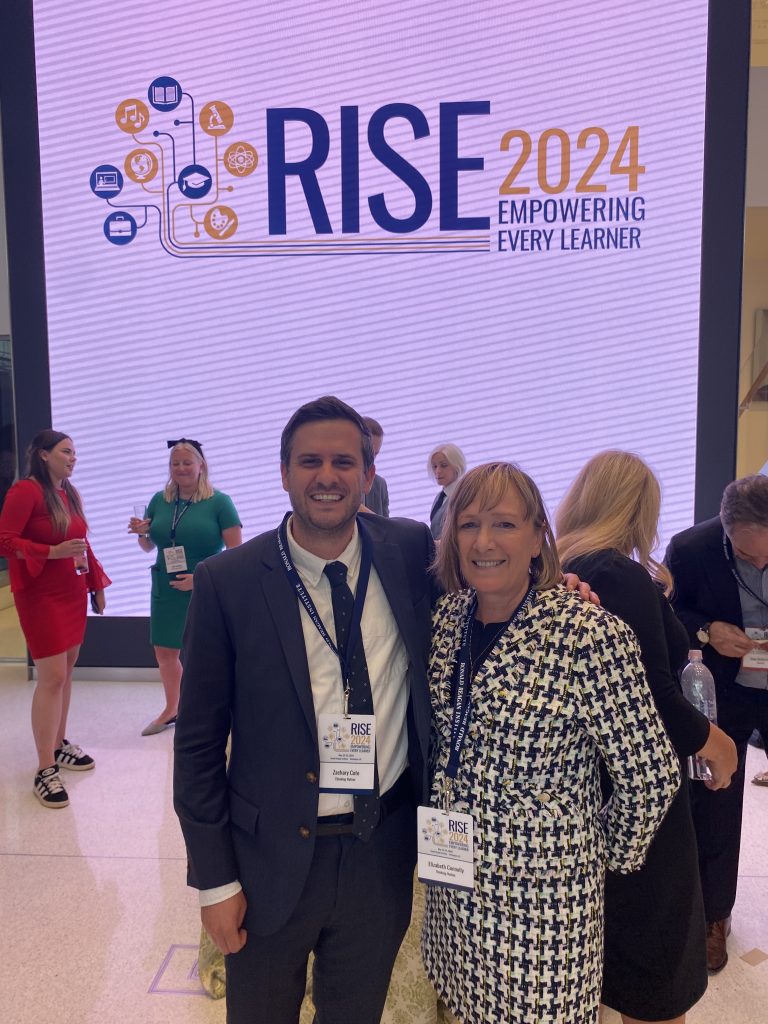What can we collectively do to empower every learner? Dozens of government officials, education leaders, and teachers convened at the Ronald Reagan Institute in Washington, D.C. to think about the best way to answer that question. This past May 23nd marked the 7th annual Reagan Institute Summit on Education, RISE.

The sheer location of the Reagan Institute, with the White House in sight, presents a sort of urgency to the event. In my job at Thinking Nation, I live in this state of urgency to pursue a better education for our students. Our organization seeks to shift the paradigm of social studies education by equipping teachers to empower their students in disciplinary thinking. We know that when students engage with the past they study, rather than merely remember it, they are empowered to flourish in both civic and economic life. I was anxious to hear how others’ areas of focus overlapped with ours.
Many of the panels throughout the summit offered provoking ideas and plans of action. However, it was the first panel that I believe set the tone for needed conversations on how we can empower students. Three state leaders in education discussed accountability in schools as they answered the question “Have we reached the low watermark for accountability in schools?” Virginian State Secretary of Education, Aimee Guidera, Maryland State Superintendent of Schools, Carrie Wright, and North Dakota State Superintendent of Public Instruction, Kirsten Baesler each offered their state’s approach to cementing high standards and corresponding accountability in their schools.
Wright previously served in this role for the state of Mississippi. During her tenure, the state exponentially increased reading scores as evidenced by 4th graders in the state going from 50th to 21st in the nation on the NAEP reading scores. Now in her home state of Maryland, she offered up key aspects of that success. Data was at the core of it.
Data has to drive instruction, and teachers need to know how to leverage the data effectively. If they don’t? “Build professional learning,” she noted. Building teacher capacity is critical to empowering students. This clear connection between accountability standards, corresponding data to measure those standards, and teacher capacity to use that data, was echoed by the other two leaders as well.
Guidera acknowledged that we, as the adults, need to hold ourselves accountable to helping students meet high expectations. In fact, Baesler took it further, stating, “There is education malpractice if we don’t believe our students can achieve high expectations.” But, as all three noted, with No Child Left Behind, the high standards were not coupled with building teacher capacity. This key component, professional learning for teachers, is key to the success of an accountability model embodied by high expectations.
Thinking Nation prioritizes data at the center of all that we do with schools. In fact, we’ve leveraged generative AI to make that data instant and easily digestible by teachers in order to facilitate student growth effectively without overburdening teachers. Discernable data can better equip teachers, align whole departments, increase interdisciplinary collaboration, and most importantly, lead to empowered students.
To be transparent, as a former middle school history teacher, I questioned the need for data in the classroom. I felt that it just encouraged teachers to teach to a test and weakened the art of teaching. But I was missing the bigger picture.
Without data, I didn’t have a common language of success to use with my colleagues. As a department head, I struggled to break down the silos of our classroom walls. Collaboration without a shared focus and a way to measure that focus was always well intentioned but difficult to implement. Data has changed that.
The shared focus exists by rooting social studies in the discipline, rather than the myriad contents contained within. Then, teachers can have a common language to measure success. They can engage in high level conversations about student success by leveraging resulting data from assessments on disciplinary thinking. When built into the accountability models of schools, we’ve found this to be transformative. It gives meaning to the classroom for students and empowers them as thinkers ready to shape the future.
As the state leaders on the panel noted, we need high expectations in our schools. But building teacher capacity to help students meet those expectations is critical. In many ways, we’ve failed our teachers. We’ve continued to burden them with demands without giving them the tools to meet those demands. I hope that as other leaders and policy makers at RISE reflected on those insights, we can collectively work to enact real and systemic change to give teachers what they need to empower our students. Those students, our communities, and our country deserve it.